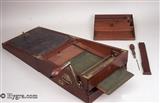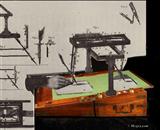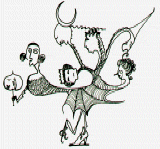|
| |
Brunel's Polygraph Mechanism courtesy of Science Museum London
Please click on images to enlarge | thumbnail index |
high resolution
|
Description: Photos of Brunel patent (1799) Polygraph courtesy Science
Museum London (No 556)
Origin: UK; Circa:
1805; Materials: Ebony, brass,
steel.
I have documented an
original box for the Polygraph (No 129) at: http://hygra.com/box/873WB-Brunel-patent-polygraph/ It
is the only so-far known box with secret drawers:
Brunel's writing machine was first
patented in the USA in 1799; three months later he was granted a UK
patent, which was published in:
The Repertory of Arts,
Manufactures, and Agriculture, Consisting of Original Communications,
Specifications of Patent Inventions, Practical and Interesting Papers,
Selected from the Philosophical Transactions and Scientific Journals
of All Nations ...
https://books.google.co.uk/books/reader?id=NaYoAQAAMAA
J&printsec=frontcover&output=reader&pg=GBS.PA146
The machines were manufactured and sold by J. H. Farthing, Cornhill,
London.
See "Specification of the Patent granted to Mr. MARC ISAMBARD BRUNEL, of Canterbury.-Place, in the Parish of St. Mary, Lambeth in the County of Surrey, Gentleman ; for his Invention of a certain new and useful Writing and Drawing Machine, by which two or more Writings or Drawings, resembling each other may be made by the fame Person at the same Time. Dated April 11, 1799"
Request
current list of available sewing boxes with prices.
Request
current list of available writing boxes with prices.
Request
current list of available jewelry boxes with prices.
Request
current list of available tea caddies with prices.
boxes@hygra.com
|
 (Small).JPG)
When Bedini
Published his book Thomas
Jefferson and His Copying Machines
in 1984 the only example he was able to trace was in the
Science Museum in South Kensington.
The mechanism is currently in storage, but I was given the opportunity
to take some photos.
XXIX.
Specification
of the Patent granted to Mr.
MARC
ISAMBARD BRUNEL,
of
Canterbury.-Place,
in the Parish of St. Mary, Lambeth in
tbe
County of Surrey, Gentleman ;
for
his Invention
of a certain new and useful Writing and Drawing
Machine, by which two or more Writings
or Drawings, resembling each other may be made
by the fame Person at the same Time. Dated
April 11,
1799
|

 (Small).JPG)
|
The pen-holders are hinged
from a gantry. They are made from wrought brass.
|
Please click on images to enlarge | slide show | thumbnail index |
Please click on images to enlarge | slide show | thumbnail index |
Please click on images to enlarge | slide show | thumbnail index |
Please click on images to enlarge | slide show | thumbnail index |
 (Small).JPG)
|
The ebony frames are joined
with comb joints
The mahogany strut with brass between connects the two pens.
|
| Detail of the pen cafe. |
 (Small).JPG)
|
Please click on images to enlarge | slide show | thumbnail index |
Please click on images to enlarge | slide show | thumbnail index |
Please click on images to enlarge | slide show | thumbnail index |
 (Small).JPG)
|
"A
denotes a desk with folding
hinges, which, when the parts fixed upon it
are removed, may be folded together like a common
portable writing-desk...
"two
uprights E, E, which rest
upon the desk, and have two pins or tenons preceding
from the bottom of each, and let into the
desk, to render them steady, but admitting of
their being taken off and put on at pleasure."
|
Please click on images to enlarge | slide show | thumbnail index |
Please click on images to enlarge | slide show | thumbnail index |
The mechanism in the Science Museum is labeled:
BRUNELS PATENT No 554
Sold by I. H. Farthing
Cornhill London.
|
 (Small).JPG)
|
Please click on images to enlarge | slide show | thumbnail index |
The box frame of the Science Museum Polygraph is a
modern reproduction.
|
 (Small).JPG)
|
 (Small).JPG)
|
When not in use the mechanism was designed to fit in the
drawer of a traveling writing desk. |
Please click on images to enlarge | slide show | thumbnail index |
 (Small).JPG)
|
The mechanism is currently in storage, but I was given the opportunity
to take some photos.
|
Imagine a world before the copying machine. If you wanted a copy,
it was necessary to write it again!
A discussion at the Lunar Society in Birmingham inspired an invention which
changed the world:
 
Benjamin Franklin gave the Watt's box to his friends. Thomas Jefferson embraced
the technology and kept copies of everything.
Description:
Ref: 873WB A http://hygra.com/box/873WB-Brunel-patent-polygraph
Rare Polygraph by I. H Farthing of
Cornhill London to the patent design of Marc Isambard Brunel (1769-1849)
The box is in the Campaign style, made of solid mahogany using dovetail joints
reinforced with brass corners, straps and edges. The box has countersunk brass
handles. There is a drawer designed to hold the Polygraph mechanism when not
in use. There are seven secret drawers concealed behind three sprung panels.
The box retains its original inkwells. The Polygraph mechanism which
enabled the movements of one pen to be copied by another is now missing.
Origin: ; Circa: 1803
; Materials: mahogany brass.
Size: 50.6 cm wide by 30 cm by 19.2 cm: 20
inches wide by 11.8 inches by 7.6 inches.
Condition: good overall;
lacking polygraph mechanism, working locks and keys; see images
Keywords: Hygra.com, Antique box, polygraph,
Mark Isambard Brunel, I. H Farthing, writing box, writing desk, mahogany,
campaign style, writing and drawing machine,
Please click on images to enlarge | slide show | thumbnail index |
All text and images and linked images are ©
1999-2013 Antigone Clarke and Joseph O'Kelly. If you require any further
information on permitted use, or a licence to republish any material, email us
at copyright@hygra.com
|
